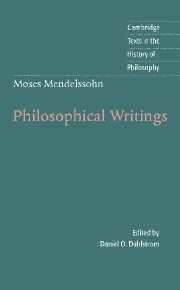Book contents
- Frontmatter
- Contents
- Acknowledgments
- Introduction
- Chronology
- Further reading
- Note on texts and translation
- Philosophical writings
- Preface
- Part I
- Part II
- On evidence in metaphysical sciences
- On the ability to know, the ability to feel, and the ability to desire
- On the question: what does “to enlighten” mean?
- Index
- Cambridge texts in the history of philosophy
On the question: what does “to enlighten” mean?
Published online by Cambridge University Press: 05 June 2012
- Frontmatter
- Contents
- Acknowledgments
- Introduction
- Chronology
- Further reading
- Note on texts and translation
- Philosophical writings
- Preface
- Part I
- Part II
- On evidence in metaphysical sciences
- On the ability to know, the ability to feel, and the ability to desire
- On the question: what does “to enlighten” mean?
- Index
- Cambridge texts in the history of philosophy
Summary
The words “enlightenment,” “culture,” “education” are still newcomers to our language. At the present time they belong merely to the language of books. The common masses scarcely understand them. Should this be a proof that the theme is also novel to us? I do not believe so. One says of a certain people that they do not have a definite word for virtue or for superstition, although one may correctly ascribe a considerable measure of both to them.
Linguistic usage, meanwhile, appears to want to make a distinction among these words which have similar meanings, but it has not yet had time to establish their borders. Education, culture, and enlightenment are modifications of social life, effects of the hard work and efforts of human beings to improve their social condition.
The more that art and hard work have brought the social condition of a people into harmony with the vocation of a human being, the more educated this people is.
Education breaks down into culture and enlightenment. The former seems to apply more to the practical dimension, that means – objectively – to excellence, finesse, and beauty in trades, arts, and society's mores, and – subjectively – to proficiency, hard work, and skill at those trades, arts, and mores as well as to inclinations, drives, and habits making up that proficiency, hard work, and skill.
- Type
- Chapter
- Information
- Moses Mendelssohn: Philosophical Writings , pp. 311 - 317Publisher: Cambridge University PressPrint publication year: 1997
- 2
- Cited by



